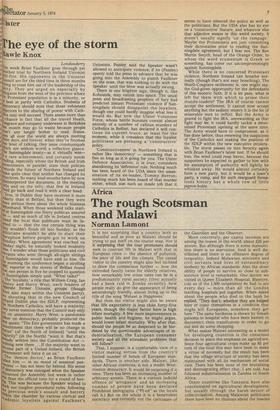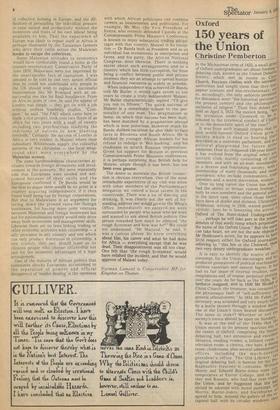Africa
The rough Scotsman and Malawi
Norman Lamont
It is not surprising that a country both as beautiful and as poor as Malawi should be trying to put itself on the tourist map. Nor is it surprising that the tour promoters should seek to contrast life in Malawi with that in European cities — the absence of pollution, the pace of life and the climate. The casual visitor to the country might also feel inclined to draw the comparison further — how the extended family cares for elderly relatives, how remarkably low crime rates can be in a predominantly rural society (they actually had a bank raid in Zomba recently), how people really do give the appearance of being astonishingly friendly, almost living up to the title of the song 'Malawi is Happiness.'
But then the visitor might also be aware that life expectancy is less than forty-five years, though the major factor here is high infant mortality. A few more improvements in public health and hygiene, he might argue, would lower infant mortality. Why after that, should the people be so desperate to be burdened by the questionable advantages of industrialisation, the European consumer society and all the attendant problems that will follow?
That, I suppose, is a comfortable view of a visitor making sorties from the country's limited number of hotels of European standards. There is another side. Malawi, like other African countries, is not a model Westminster democracy. It would be surprising if it were. There has been an increasing number of arbitrary arrests. There is a curious judicial offence of 'arrogance' and an increasing number of people have been declared Prohibited Immigrants. ("P1-ed" as the locals call it.) But on the whole it is a benevolent autocracy and certainly not the caricature of the Guardian and the Observer.
More concretely, per capita incomes are among the lowest in the world, about £35 per annum. But although there is some malnutrition there is no starvation, food is well distributed and there is no offensive degree of inequality. Indeed Malawian ministers and civil servants lead lives of extraordinary modesty by African standards. Also the sheer ability of people to survive so close to subsistence level is remarkable. One doctor we visited in Queen Elizabeth Hospital, Blantyre, told us of the 1,500 outpatients he had to see every day — more than all the London teaching hospitals put together. When asked about the people who died in the bush he replied, "They don't; whether they are helped here or come themselves in a condition that might kill Europeans, somehow they get here." The same hardiness is shown by female patients in hospital who have been known to disconnect their transfusions in order to go out and do some shopping. What makes Malawi interesting as a model for developing countries is the conscious decision to place the emphasis on agriculture. Since four agricultural crops make up 85 per cent of the total this may have been to make a virtue of necessity but the result has been that the village structure of society has been maintained with all its mechanism of social care. There has been none of the brutalising and disintegrating effect that, I am told, has followed industrialisation in Zambia or South Africa.
Other countries like Tanzania have also concentrated on agricultural development, but usually through the harsh device of collectivisation. Among Malawian politicians there have been no illusions about the lessons
of collective farming in Europe, and the difficulties of persuading the individual peasant to raise output and productivity without the incentives and fruits of his own labour being available to him. That the experience of Europe was likely to repeat itself in Africa is perhaps illustrated by the Tanzanian farmers who drive their cattle across the Malawian border to escape the collectives.
Some Malawian attitudes to economics would have comfortably found a home in the counter-revolutionary Conservative Party of June 1970. Malawians were not impressed by the unacceptable face of capitalism. I was amused to be told by one very senior official that he could not understand why people in the UK should wish to replace a successful businessman like Mr Rowland with an unsuccessful one like Sir Basil Smallpeice. From an African point of view, he said the appeal of Lonhro was simple — they got on with a job without endless feasibility studies. "Compare." he said, "the FAO which came here to study a rice project. took over two floors of an office for two years with a staff of twenty including two psychiatrists studying the reactions of natives to 'new planting methods." Certainly the success of Lonrho in Africa is very evident in Malawi where their subsidiary Whiteheads supply the colourful patterns of the chirundus — the local wrapround skirt worn everywhere by the Malawian women.
The same hardheadedness characterises attitudes towards foreign investment and involvement in the economy. We were repeatedly told that Europeans were needed and welcomed because of their skills and the Europeans confirmed it. Dr Banda would be the first to argue there would be no point in a country acquiring independence, if it then found itself being run by foreign corporations. But that to Malawians is an argument for laying down the ground rules for foreign businesses, for having more joint ventures between Malawian and foreign businesses but not for nationalisation which would only drive away both investment and management skills. Likewise there are no laws linking trading or other economic activities with citizenship — a silly provision in any country and one which can only produce distortions in citizenship; a new country, they feel, should , want as its citizens people who choose citizenship not just for the economic advantages of a legal arrangement. One of the features of African politics that sometimes shocks Europeans accustomed to the separation of powers and official disapproval of 'insider dealing' is the openness with which African politicians can combine careers as businessmen and politicians. For example, Mr Moi, the Vice President of Kenya, who recently defended Uganda at the Commonwealth Prime Minister's Conference, is known to enjoy substantial trading advan tages with that country. Malawi is no exception — Dr Banda both as President and as an individual has investments in enterprises and farms, and his party, the African National Congress, does likewise. There is nothing secret about such arrangements and in a country which has little corruption, far from being a conflict between public and private interests they are an attempt to spread human and financial resources as widely as possible.
When independence was achieved Dr Banda told Mr Butler it would take seven to ten years to create a truly independent Malawi. Mr Butler characteristically replied, "I'll give you ten to fifteen." The quick success of Malawi is a remarkable tribute to the personality of one man. The pragmatism at home, on which that success has been built, has been matched by a pragmatism abroad which is now notorious. However much Dr Banda dislikes racialism he also likes to face facts in Rhodesia and South Africa. He is disliked by younger African leaders for his refusal to indulge in 'Brit-bashing.' and his readiness to attack Russian imperialism. Given his support for Britain at previous Commonwealth Prime Ministers conferences, it is perhaps surprising that British help for Malawi, ample though it has been, has not been even greater.
The desire to maintain the British connec tion is obvious everywhere. One of the most
remarkable experiences of my visit was when with other Members of the Parliamentary delegation we visited a local tavern in the countryside. There was a lot of dancing and drinking. It was clearly not the sort of forwarding address one would give to the Whip's Office. Immediately we entered we were surrounded by people who knew who we were and wanted to ask about British politics. One person remarked how much he admired "the rough Scotsman and how was he?" We could not understand. "Mr Macleod," he said. It was a curious phrase. He knew everything about him, his career and what he had done' for Africa — everything except that he was dead. Their disappointment was all too clear. One felt that 'the rough Scotsman' would have relished the incident, and that he would approve of Malawi today.
Norman Lamont is Conservative MP for Kingston-on-Thames



























 Previous page
Previous page